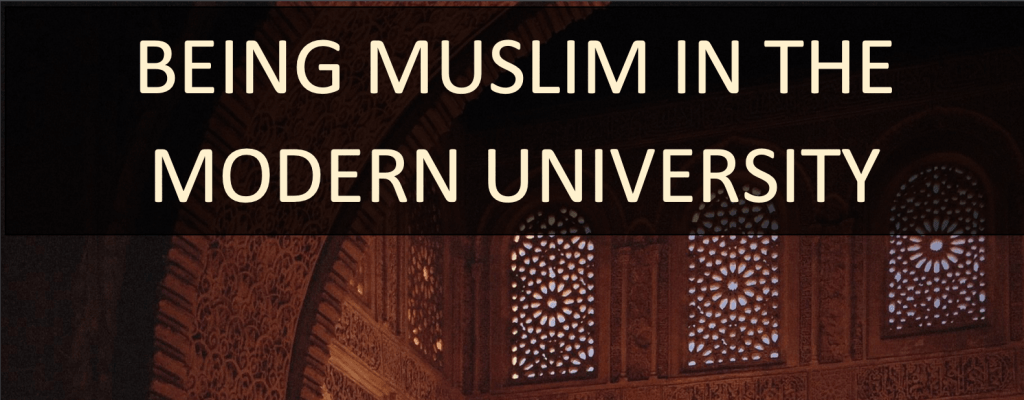A conference @CambridgeUniversity Sun, 3rd Nov, 2019. Organised by Cambridge University Islamic Society. Watch the videos from the conference below, featuring Imam Dawud Walid, Abdulhakim Murad (Tim Winter) and IHRC’s Arzu Merali.
Background and Purpose
Many Muslims studying in secular, Western universities experience intimate tension, alienating confusion, and daily cognitive dissonance: their lectures, tutorials, cultural activities and political engagements are all conducted within a ‘secular’ space. Here, selves are moulded, values and meanings are negotiated, knowledge is produced, and reality is constructed without an ostensible submission to God or grounding in any faith tradition, let alone Islam. Education, in this context, is underpinned by certain assumptions that are often incongruent to the first principles provided by our ‘ulama.
This often leads to students constructing a (false) dualism between being Muslim and their academic work, with the relation between the two frequently superficial or distorted. Additionally, for socially conscious students, the dynamics of socio-political engagement in the West require them to make increasingly difficult choices that can often be at odds with their faith. As graduate students struggling with these challenges ourselves, we see an urgent need for a space for Muslim university students to reflect on such questions, and to try to collectively imagine a more holistic experience for Muslims in secular Western universities, and indeed other secular spaces.
In response to these challenges, ‘Being Muslim in the Modern University’ aimed to discuss some of the questions, challenges and opportunities that Muslim students face whilst studying at the interface of the secular/Islamic: covering the ethical, political, epistemic and metaphysical. The theme was evidently quite broad, but the intentions were for the sessions to be fairly introductory in order to initiate discussions to continue throughout the year. The conference was aimed at Muslim students and staff of the University of Cambridge as well as other universities, with a particular aim of being accessible to undergraduates.
Videos courtesy Cambridge ISoc on Youtube. Filmed by Serenity Photography.
Opening Session: Student Experiences on Being Muslim in the Modern University Speaker: Taskeen Adam, PhD candidate at the Centre of Development Studies, University of Cambridge. She is pursuing research on the role of Massive Open Online Courses in supporting the marginalised in South Africa.
Session 1: How did we get here? The impact of modernity and secularisation on knowledge systems
Speaker: Sidi Ahmed Paul Keeler
Description: This session will chart the historical journey from the Christian West to the modern “Secular” West – specifically focusing on the rise of the “secular” university. Chair: Dr Mezna Qato, Margaret Anstee Research Fellow at Newnham College, University of Cambridge. She holds a DPhil from the University of Oxford and is currently completing a book on the history of education for Palestinians.
Session 2: What is an Islamic approach to knowledge? Understanding the pursuit of ilm Speaker: Sidi Hasan Spiker
Description: This session aims to be a brief theoretical introduction to different ways of thinking, knowing and being, outlining the guiding principles of an Islamic worldview. Chair: Iman Masmoudi, MPhil at the Faculty of Asian and Middle Eastern Studies, University of Cambridge. Having recently completed a BA from Harvard University, she is pursuing research on the social history of 18th century Tunisia through Sharia court records.
Session 3: Practical experiences in bridging the Islamic and the secular
Speakers: Professor Recep Şentürk and Shaykh Abdal Hakim Murad
Description: This session discusses practical attempts to find the appropriate balance between the “secular” and “Islamic” approaches, and to tease out the tensions and opportunities inherent in this effort. Chair: Dr Najah Nadi is Aziz Foundation Lecturer in Islamic Studies, Cambridge Muslim College. She holds a DPhil from the University of Oxford and researches fiqh (jurisprudence), uṣūl al-fiqh (legal theory), ‘ilm al- kalām (philosophical theology) and manṭiq (logic).
Session 4: Is your discipline Islamic?
Speakers: Dr Shuruq Naguib, Professor Mehmet Asutay and Dr Zeyn Green-Thompson Description: This panel deals with the epistemic issues that scholars might face whilst grappling with the often-contesting paradigms of their faith and their scholarship. Chair: Nabila Idris, PhD candidate at the Centre of Development Studies, University of Cambridge. She is pursuing research on social protection policies in Bangladesh.
Session 5: Being a socially conscious Muslim: Approaches for the student activist
Speakers: Imam Dawud Walid and Arzu Merali
Description: As the university environment often encourages active socio-political engagement, the aim of this panel is to discuss how one can be socially conscious from within the Islamic tradition. Chair: Amina Shareef, PhD candidate at the Faculty of Education, University of Cambridge. She is pursuing research on the impact of Islamophobia on young British Muslim sense of belonging.
Closing Session: Reflections
Description: Open discussion to synthesise and reflect on the learnings of the day as well as share thoughts on how to improve going forward. Facilitator: Nabila Idris.







